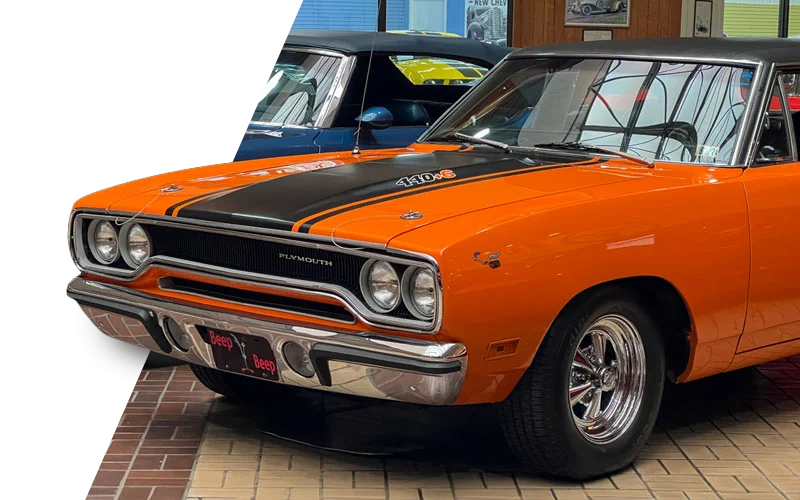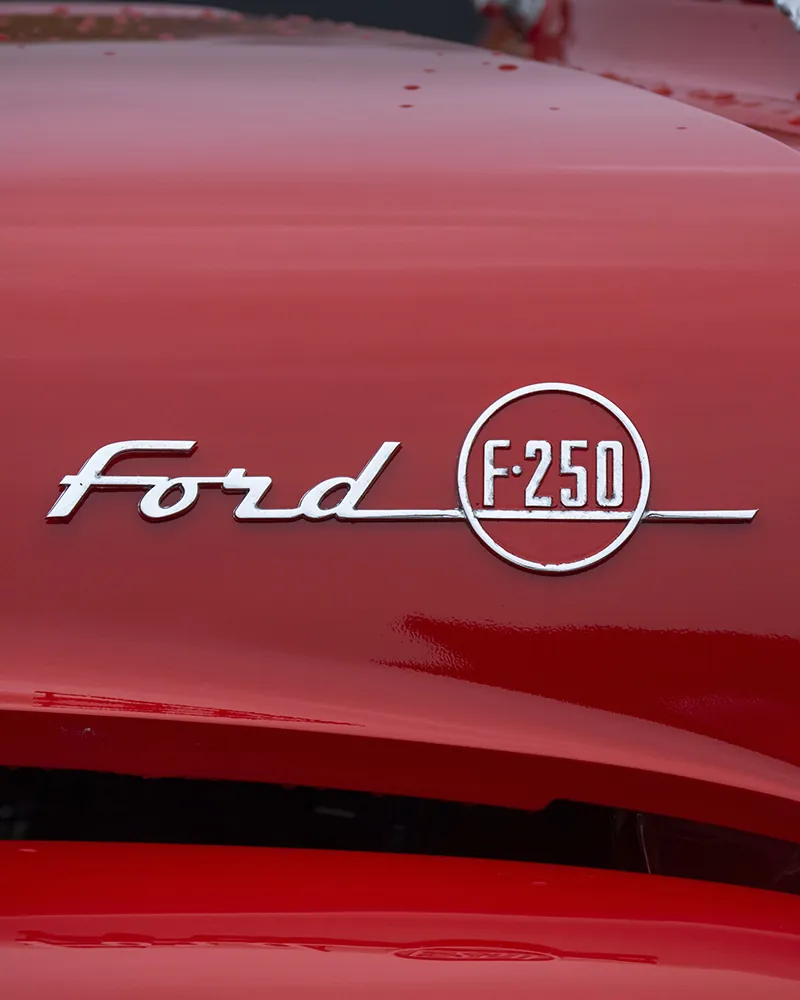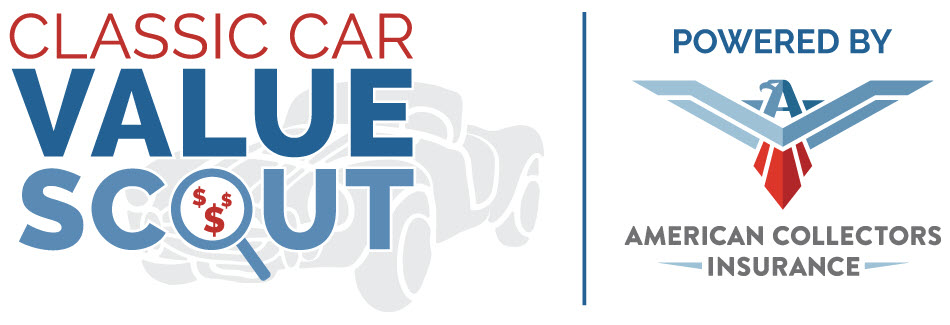How to Determine Your Classic Car’s Value

For any antique and classic car collector, it’s important to calculate an informed estimate of a vehicle’s value — especially if you’re planning to buy, sell or insure your classic, antique, or collector car. Determining the value of your classic car is a crucial step in navigating the ever-evolving collector car market, which can see fluctuations in prices based on various factors such as rarity, condition, and historical significance.
Engaging in a thorough classic car valuation process allows you to make informed decisions and negotiate confidently. Thankfully, in today’s digital age, a plethora of valuation tools are readily available, leveraging historical sales data and market trends to assist collectors in arriving at accurate estimates.
How much is my Classic Car worth?
Classic car values are determined by a multitude of factors both in and out of the owner’s control. A collector car’s market value is best determined by understanding supply and demand, using historical sale prices, and reviewing current asking prices on available inventory. For collector cars, 70% of classic and antique cars are sold through private sales, 20% through auctions and 10% through dealerships. With all of these various channels in play, no single valuation or appraisal tool can definitively tell you precisely how much your vehicle is worth. However, using multiple valuation sources will provide you a better starting point in determining market value for the vehicle value.
Fortunately, there are several free collector car value guides and tools that, collectively, allow you to research the range of values for your car (based on the trim package, included options and vehicle condition) and help determine the price you should ask (or offer) on a collector car. Below you will find a list of reputable sources to refine your estimate of your vehicle’s value.

5 Best Online Classic Car Valuation Tools
Classic car valuation tools function by aggregating and analyzing a vast array of historical sales data, market trends, and specific attributes of individual vehicles. These tools leverage algorithms and data models to consider factors such as make, model, year, condition, mileage, rarity, and recent auction results. By processing this information, they generate an estimate of a classic car’s value that reflects its current market worth.
Some of the best online car evaluation tools include:
Classic Car Value Scout

ClassicCarValue.com, or Classic Car Value Scout, is a first of its kind tool that allows users to find an accurate classic car value online by comparing classic and collector car valuation data from both online and offline sources.
The classic car valuation prices are based on the specific vehicle year, make, model, vehicle trim and included factory options of a classic or collector car. American Collectors Insurance partnered with acclaimed valuation experts like NADA, Old Cars Report Price Guide, Classic.com, and VMR Auto Guides to create a better classic car valuation tool.
National Automobile Dealers Association (NADA)

The National Automobile Dealers Association (NADA Guides) is a trusted, comprehensive source that has created the searchable NADA Guides – Classic & Collectible Car Values to provide a clickable tool to quickly estimate the Low Retail, Average Retail and High Retail values of classic and collectible cars based on the specific vehicle year, make, model, vehicle trim and included factory options.
Collector Car Market Review (VMR)

Collector Car Market Review compiles auction, sales reports, classified listings and other proprietary data sources to estimate values in their VMR Collector Car & Truck Price Guide estimating car value using a 5-Level Condition Guide.
Old Cars Weekly Reports

Each Old Cars Report features current Price Guide values and related auction “sold” prices – PLUS nuggets of historical facts about your model. Just search for your Year, Make and Model.
Classic.com

Classic.com is a search engine and analytics platform that aggregates data from several auction houses as well as dealer listings in the classic, collector, and exotic car industry. It empowers classic car buyers, sellers, and enthusiasts with insights based on deep data – including market values, price comparisons, auction alerts and more. View market statistics for the classic car industry at classic.com/stats and follow your favorite market at classic.com/markets.
Protect Your Collector Car Today
Your collector car is your prized possession — Work with a classic car insurance company that cares about your vehicle as much as you do.
What Impacts Antique and Classic Car Values?
Classic car value and antique car values are determined by a multitude of factors both in and out of the owner’s control. A collector car’s value is appraised according to its rarity, condition, restoration quality, and market demand.
The economic principle of supply and demand applies to classic cars, just as they would to any vehicle or valuable assets such as other precious collectibles. Whether you’re driving a new car or a vintage or antique vehicle, its value depends on its current global inventory, the historical sale price of the vehicle, and its going market rate determined by demand among other collectors.
Rarity
Rarity significantly impacts a classic car’s value by elevating its desirability among collectors. Limited production numbers make rare models harder to find, driving up demand and commanding higher prices. The exclusivity and uniqueness associated with rare cars enhance their appeal, creating a competitive market environment. Collectors are willing to pay a premium to own a piece of automotive history that few possess, turning these rare vehicles into prized and valuable assets within the collector car community.
Condition
The condition of a classic car is a pivotal determinant of its value, shaping its appeal and market worth. Ranging from cars just used for parts to those in excellent condition a car’s state has a direct bearing on its desirability among collectors and enthusiasts.
- Parts Cars: An undrivable vehicle with no functional value. These vehicles are used mainly for their parts which can be used to restore other cars.
- Restorable: A restorable car is in poor condition but still retains functional value because it can be restored to be roadworthy again.
- Good: A good car requires some restoration work to increase its market value.
- Very Good: A very good car is fully restored and is in good working condition.
- Fine: A fine car is a fully restored car in good condition that has retained many of its functional original equipment manufacturer (OEM) parts.
- Excellent: An excellent car is perfectly restored or is in original condition.
Whether a vehicle is destined for restoration, boasts a history of meticulous care, or stands as a testament to its era, the condition underscores the essence of what makes each classic car a captivating piece of automotive history.
Restoration Quality
The quality of the restoration has a big impact on how much a classic car is worth, going beyond just how it looks. When a restoration is done really well, following the original specifications and using authentic materials, it can make the car much more valuable. Paying close attention to the small details, the craftsmanship, and staying true to how the car was originally made turns a classic car into a true masterpiece.
On the other hand, if a restoration isn’t up to par or doesn’t stick to the original specs, the car’s value can go down because any imperfections or changes from the original design can take away from the historical and visual charm that make classic cars special.
Market Demand
Increased demand for specific models raises their worth as collectors compete for ownership, reflecting the car’s appeal and emotional resonance. On the other hand, decreased demand can lead to value stagnation or decline, emphasizing the need to track shifting trends within the collector car community. Recognizing this interplay is crucial for making informed decisions in the dynamic world of automotive collecting.
The Importance of Understanding Your Car’s Market Value
Knowing your vehicle’s market value is an essential precondition to selling it or getting it appraised for insurance. Similarly, you’re looking to buy a car, it’s equally important that you know the going market price of the vehicle. This holds especially true for car enthusiasts and collectors seeking to add classic or vintage cars to their collections.
Understanding the current value of a classic or collector vehicle takes into account various factors beyond the mere car price, including the car’s condition, rarity, historical significance, and recent trends in the collector car market. Armed with this up-to-date knowledge, you can confidently negotiate the best deal possible, whether you’re buying or selling. This is particularly crucial in the world of collector vehicles where values can vary widely based on a myriad of factors unique to each vehicle.
Finding The Right Insurance Coverage For Your Classic Car
At American Collectors Insurance, we know that your vehicle is more than just a car… it’s your passion. That’s why we offer broad insurance coverage and additional protection bundles so you can enjoy your vehicle and have the peace of mind of knowing that you are covered. Browse our collector and classic car insurance packages today to find a policy that’s right for your vehicle and its unique needs. Reach out to our team for more insight into classic car values or our coverage options. Call 1-877-958-0978, Monday- Friday from 8:00 a.m. to 8:00 p.m. EST & Saturdays from 8:00 a.m. to 5:00 p.m. EST. You can also email us at [email protected].
Insurance Designed For Collectors, By Collectors
Enjoy broad classic & vintage auto insurance coverage tailored specifically for collectors with optional protection bundles suited to your needs.
Get a fast and free quote today & join the collector car insurance company that is Rated #1 in Customer Service!